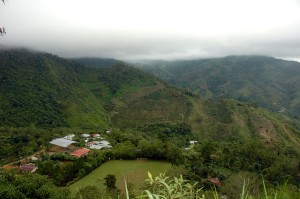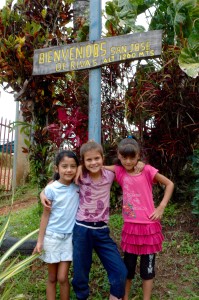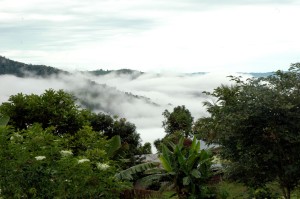Un viaje inolvidable
Pura vida. “Pure life.” This is the motto and catchphrase of Costa Rica. The phrase is a greeting, a farewell, an expression of well being, or a way to give thanks. To Costa Ricans, or “Ticos,” pura vida implores people to live life to the fullest, to really live, and to appreciate every moment.

Tucked away deep in the Cordillera de Talamanca, the mountain range that is situated on the border of Costa Rica and Panama, there is a small village called San Jose de Rivas. This town cannot be found on a map, as only about forty families reside there and the closest city to San Jose de Rivas is San Isidro, about an hour away. Many of the families in the village have a family member who commutes there every day, some of them staying for the entire week. Some families are interrelated, as all the brothers, sisters, cousins, aunts and uncles all live together there, some under the same roof.
The men generally work in the fields, planting and harvesting coffee. The young kids go to the small two-classroom school in the village, which is run by a few women who live there, mothers themselves. Other women have gardens in their backyards, selling vegetables like cilantro to other people in the town. Older kids go to school with kids from the neighboring villages in a nearby town. This is the simple culture of a simple town. You hand-wash your clothing and leave it out to dry. Maybe you were part of the few lucky families to have a television set. Living there felt like living apart from the hyper-connected, in-touch, technology-powered rest of the world.
A major aspect of Latin American culture is family. Families in Latin America typically all live under the same roof. Sons and daughters are expected to live the life their parents would prescribe for them, continuing in their line of work and helping take responsibility with siblings. When I was welcomed into my Costa Rican family in June 2013, I seamlessly transitioned to being a member of the family. I had my own room, I dined with them, played games with my new younger siblings, and helped the older siblings with their English homework. While they were all curious about my American life, it was just a curiosity—not a longing. This family was content in their simple life, and I had so much respect for them.
The beauty of San Jose de Rivas was its simplicity. The town was settled so high in the mountains that clouds would descend down into it, indicating that the daily rainfall was coming soon. Everyone in the town knew and loved each other. They celebrated their village and were proud of their culture. They taught me the art of Latin American dance – the bachata, merengue, and cumbia. Their lives were pure, their complications trivial relative to their happiness. It was that embodiment of the pura vida culture that I brought home with me, and try to implement in my daily life even today.


